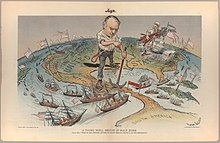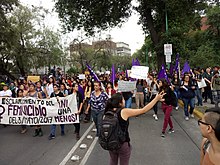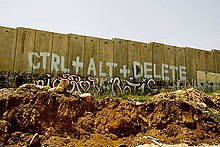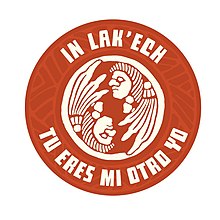Decolonization is the undoing of colonialism, the latter being the process whereby imperial nations establish and dominate foreign territories, often overseas. The meanings and applications of the term are disputed. Some scholars of decolonization focus especially on independence movements in the colonies and the collapse of global colonial empires. Other scholars extend the meaning to include economic, cultural and psychological aspects of the colonial experience.
Postcolonial feminism is a form of feminism that developed as a response to feminism focusing solely on the experiences of women in Western cultures and former colonies. Postcolonial feminism seeks to account for the way that racism and the long-lasting political, economic, and cultural effects of colonialism affect non-white, non-Western women in the postcolonial world. Postcolonial feminism originated in the 1980s as a critique of feminist theorists in developed countries pointing out the universalizing tendencies of mainstream feminist ideas and argues that women living in non-Western countries are misrepresented.
Walter D. Mignolo is an Argentine semiotician and professor at Duke University, who has published extensively on semiotics and literary theory, and worked on different aspects of the modern and colonial world, exploring concepts such as decoloniality, global coloniality, the geopolitics of knowledge, transmodernity, border thinking, and pluriversality. He is one of the founders of the modernity/coloniality critical school of thought.

In postcolonial studies and in critical theory, the term subaltern designates and identifies the colonial populations who are socially, politically, and geographically excluded from the hierarchy of power of an imperial colony and from the metropolitan homeland of an empire. Antonio Gramsci coined the term subaltern to identify the cultural hegemony that excludes and displaces specific people and social groups from the socio-economic institutions of society, in order to deny their agency and voices in colonial politics. The terms subaltern and subaltern studies entered the vocabulary of post-colonial studies through the works of the Subaltern Studies Group of historians who explored the political-actor role of the common people who constitute the mass population, rather than re-explore the political-actor roles of the social and economic elites in the history of India.
Indigenous decolonization describes ongoing theoretical and political processes whose goal is to contest and reframe narratives about indigenous community histories and the effects of colonial expansion, cultural assimilation, exploitative Western research, and often though not inherent, genocide. Indigenous people engaged in decolonization work adopt a critical stance towards western-centric research practices and discourse and seek to reposition knowledge within Indigenous cultural practices.
Postcolonialism is the critical academic study of the cultural, political and economic legacy of colonialism and imperialism, focusing on the impact of human control and exploitation of colonized people and their lands. The field started to emerge in the 1960s, as scholars from previously colonized countries began publishing on the lingering effects of colonialism, developing a critical theory analysis of the history, culture, literature, and discourse of imperial power.

Postcolonial international relations is a branch of scholarship that approaches the study of international relations (IR) using the critical lens of postcolonialism. This critique of IR theory suggests that mainstream IR scholarship does not adequately address the impacts of colonialism and imperialism on current day world politics. Despite using the language of post-, scholars of Postcolonial IR argue that the legacies of colonialism are ongoing, and that critiquing International Relations with this lens allows scholars to contextualize global events. By bridging postcolonialism and International Relations, scholars point to the process of globalization as a crucial point in both fields, due to the increases in global interactions and integration. Postcolonial IR focuses on the re-narrativization of global politics to create a balanced transnational understanding of colonial histories, and attempts to tie non-Western sources of thought into political praxis.

Aníbal Quijano was a Peruvian sociologist and humanist thinker, known for having developed the concepts of "coloniality of power" and "coloniality of knowledge". His body of work has been influential in the fields of decolonial studies and critical theory.
The coloniality of power is a concept interrelating the practices and legacies of European colonialism in social orders and forms of knowledge, advanced in postcolonial studies, decoloniality, and Latin American subaltern studies, most prominently by Anibal Quijano. It identifies and describes the living legacy of colonialism in contemporary societies in the form of social discrimination that outlived formal colonialism and became integrated in succeeding social orders. The concept identifies the racial, political and social hierarchical orders imposed by European colonialism in Latin America that prescribed value to certain peoples/societies while disenfranchising others.
María Cristina Lugones was an Argentine feminist philosopher, activist, and Professor of Comparative Literature and of women's studies at Carleton College in Northfield, Minnesota and at Binghamton University in New York State. She identified as a U.S-based woman of color and theorized this category as a political identity forged through feminist coalitional work.
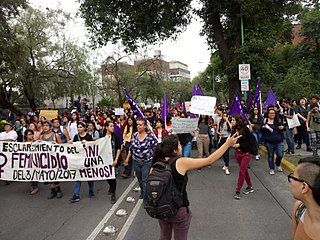
Coloniality of gender is a concept developed by Argentine philosopher Maria Lugones. Building off Aníbal Quijano's foundational concept of coloniality of power, coloniality of gender explores how European colonialism influenced and imposed European gender structures on Indigenous peoples of the Americas. This concept challenges the notion that gender can be isolated from the impacts of colonialism.

Santiago Castro-Gómez is a Colombian philosopher, a professor at the Pontificia Universidad Javeriana and the director of the Pensar Institute in Bogotá.
Ramón Grosfoguel is a Puerto Rican sociologist who belongs to the Modernity / Coloniality Group who is a full Professor of Chicano/Latino Studies in the Department of Ethnic Studies at University of California, Berkeley.

Xicanx is an English-language gender-neutral neologism and identity referring to people of Mexican descent in the United States. The ⟨-x⟩ suffix replaces the ⟨-o/-a⟩ ending of Chicano and Chicana that are typical of grammatical gender in Spanish. The term references a connection to Indigeneity, decolonial consciousness, inclusion of genders outside the Western gender binary imposed through colonialism, and transnationality. In contrast, most Latinos tend to define themselves in nationalist terms, such as by a Latin American country of origin.
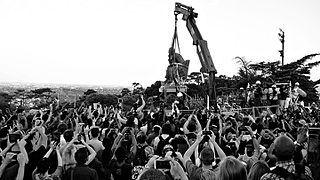
Decolonization of knowledge is a concept advanced in decolonial scholarship that critiques the perceived hegemony of Western knowledge systems. It seeks to construct and legitimize other knowledge systems by exploring alternative epistemologies, ontologies and methodologies. It is also an intellectual project that aims to "disinfect" academic activities that are believed to have little connection with the objective pursuit of knowledge and truth. The presumption is that if curricula, theories, and knowledge are colonized, it means they have been partly influenced by political, economic, social and cultural considerations. The decolonial knowledge perspective covers a wide variety of subjects including philosophy, science, history of science, and other fundamental categories in social science.
Decolonization in Latino culture refers to contemporary treatment of and work with past colonialist and imperialist influences on Latin American society in the US.

Coloniality of knowledge is a concept that Peruvian sociologist Anibal Quijano developed and adapted to contemporary decolonial thinking. The concept critiques what proponents call the Eurocentric system of knowledge, arguing the legacy of colonialism survives within the domains of knowledge. For decolonial scholars, the coloniality of knowledge is central to the functioning of the coloniality of power and is responsible for turning colonial subjects into victims of the coloniality of being, a term that refers to the lived experiences of colonized peoples.

Neither Settler nor Native: The Making and Unmaking of Permanent Minorities is a 2020 book by Ugandan political theorist Mahmood Mamdani. Mamdani argues that nationalism and colonialism have common origins and are two sides of the same coin. He argues for responding to the violence inherent in the nation-state by rejecting the identities of settler and native and participating as equal citizens instead.
The sociology of absences is a sociological theory developed by Boaventura De Sousa Santos which, he says, "aims to show that what does not exist is in fact actively produced as non-existent, that is to say as an unbelievable alternative to what is supposed to exist”.
Plural Maghreb is a book of critical essays written by Abdelkebir Khatibi first published in 1983. The book, containing six theoretical essays, presents and applies the concepts of other thought and double critique, addressing issues of language, translation, orientalism, knowledge, power, domination, and decolonization.



